Union Riveter Krissi Sandvik is back with another tutorial, this time in response to the overwhelming requests Modern Rosies has received for sewing tutorials! Here is one that is easy enough for beginners, but gives such professional looking results that we bet you'll be giving these for gifts this winter!
This was my very first tutorial from way back in 2007 when I was still working entirely in fabric, making quilts, fiber art and goodies like this awesome pillowcase! This tutorial assumes a basic level of sewing machine knowledge and ability to use a rotary cutter. If you don't have that yet, don't worry. Start by reading your machine's manual and head over to YouTube and look through the videos on sewing a straight line with your machine and rotary cutting basics. This is the perfect pattern to hone your skills! You can dooo eeet!
INSIDE-OUT PILLOWCASE
This inside-out pattern (also called a "hot dog" or "roll-sew-pull" pillowcase pattern) makes a very professional looking pillowcase and is one of the easiest ways to make pillowcases, once you've seen how it's done.
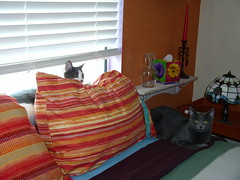 |
| Mouse and Gracie LOVE a freshly made guest bed |
For one standard pillowcase you'll need:
(just double the measurements if you're making 2)
- Fabric A (body): ¾ yd
(washed, pressed, trimmed & squared to 41"high x 27"wide) watch those directional patterns! - Fabric B: (cuff): ¼ yd
(washed, pressed, trimmed & squared to 41" high x 10" wide) - Fabric C: (trim): ⅛ yd
(washed, pressed, trimmed & squared to 41" high x 3" wide) - coordiating construction thread (ALWAYS use 100% cotton thread on cotton fabric!)
- more advanced option: decorative rayon thread(s) & disolvable stabilizer for decorative stitching
- Trim fabrics to the measurements indicated above. Even if your fabric measures correctly, you will want to square up the fabric with your rotary cutter, mat and ruler. If your measurements are off by a tiny bit, don't worry -- just make sure that pillow pairs match (so if you have 26.5" for one pillow, cut the second to 26.5" -- you can make up for the lost half inch by adding it to your cuffs!)
- Fold and press the trim fabric (3" x 41") in half longwise; wrong sides (WS) together

set aside - Spread out fabric for your cuff (41"x10") right side (RS) up

- Place body fabric RS up on top of cuff fabric and line up edges (pin if desired)

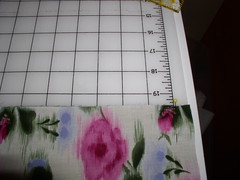
- Place folded and pressed trim fabric on top of body fabric, raw edges matching

remove pins and repin all three fabrics (it will be four layers) together - don't even consider trying step 6 until you pin!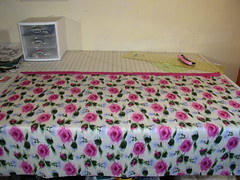
- Roll body fabric (this is the cool part!):


stop when about 4 or 5" of the cuff fabric is exposed. DO NOT ROLL CUFF FABRIC. - Fold cuff fabric over "roll" and match raw edges
 |
| - Remove and replace pins (yes, you have to)
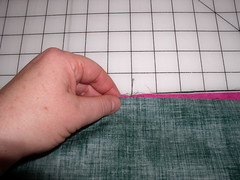

and Voila! You have a fabric "wrap."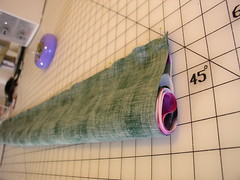
- Sew a 3/8" straight seam along the long edge

- Always SET YOUR SEAMS by pressing (lift and press with your iron on all newly stitched area - don't "rub" it on the fabric) Don't ask why you should set your seams, just do it - you'll love me for it later when you get amazing, professional results.
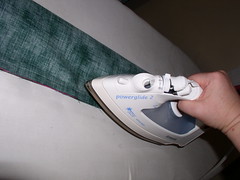
Apologies for the state of my iron. I got it as a b-day present and dropped it a week later, but it still works! It's a Rowenta Powerglide2 WITHOUT the annoying auto-shutoff and it's the only iron for me! - Flip It, Baby!
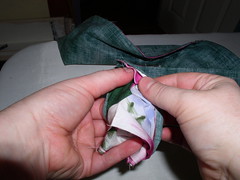


The super-keeno reason to use this technique is that the four raw edges where the fabrics meet is now enclosed inside of the cuff! No unraveling, no seams to finish! - Press your seams open and flat, using the tip of your iron and steam, if desired. Watch your fingers!

- Fold WS (yes, wrong sides!) together and match all raw edges for a French seam!**
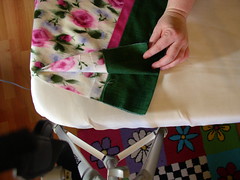
- Beginning at cuffed edge, stitch down the long side of the pillow case using a 1/4" seam allowance, turn at corner and sew along the short side to folded edge

- Set your seams!!!!!!
- Press seams open
- Turn your pillowcase inside out and press
- Using a 5/8" seam allowance, sew around the case side and bottom, encasing the raw edges (this is the inside of your pillowcase and will not be seen)

here's what the seam looks like inside the finished pillowcase: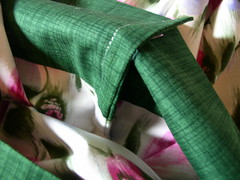
- Flip it right side out (I didn't need to remind you to set your seams first, right?) Put it on a pillow and enjoy!
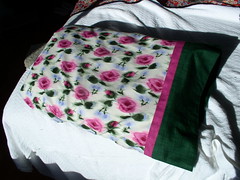
If you have a fancy machine, you can add decorative stitches to the trim fabric in between steps 11 and 12. One x-mas I made my nieces each a pillow case in their favorite colors and stitched their names along the trim fabric (yay for programmable machines with text stitches!) I've found that one or two layers of light to medium weight dissolvable stabilizer works well for me.
Here are a couple of the pillowcases I've made for our home (can you tell that my color choices are a little different than my mother-in-law's, for whom I made the above pillowcase?).

If you don't want to do a French Seam (and frankly, I don't know why you wouldn't), a zig zag stitch may also be used to finish the raw edges and prevent unraveling, but it's a lot more work and is still results in a pretty messy pillowcase interior.

This case was made using a different pattern and is a testimonial to why (1) you MUST finish your raw edges and (2) this inside-out technique ROCKS!









 Brooke Heavey
Brooke Heavey






Yay! I'm definitely trying this!
ReplyDeleteCool! If you want to, post pics of the finished product over on our fan page on facebook. https://www.facebook.com/modernrosies
ReplyDelete